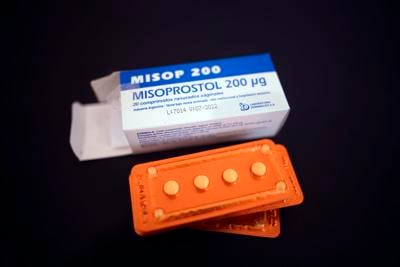The New Orleans City Council, concerned about how a new state law re-classifying two drugs that can be used to induce abortions will impact emergency care, is asking the city health department to gather data from local doctors and patients to study the issue.
The drugs, mifepristone and misoprostol, were classified as Schedule IV drugs under a new Louisiana law that will take effect in October, meaning that hospitals and doctors must treat them the same way as narcotics and keep them under lock and key.
In addition to inducing abortions, the drugs are also routinely used in hospitals to manage miscarriages and to stop heavy bleeding in pregnant and postpartum women. And as Louisiana doctors and hospitals prepare to adapt to the new law, some have expressed concerns about the time and effort it might take to retrieve the drugs and administer them in emergency situations, such as when a patient is hemorrhaging.

New Orleans City Council President Helena Moreno.
“There is concern among the medical community that these restrictions — adding these medications to the list of Dangerous and Controlled Substances — can potentially delay access and therefore delay care to women who really need these medications,” City Council President Helena Moreno said during a council committee meeting Wednesday.
The council’s motion directs the health department to create a reporting system that would survey health care providers and review medical records to determine if the reclassification of the two drugs impacted care in New Orleans. The motion had unanimous support among six council members on Wednesday, with City Council member Oliver Thomas not present at the Government Affairs Committee meeting. The council is expected to take up the motion with amendments on Thursday.
Questions about the re-classifications have grown ahead of the law taking effect next month, with over 50 doctors requesting clarification in a letter to the Louisiana Department of Health. In response, Attorney General Liz Murrill, a supporter of the law, called concerns over how the laws may delay care “disinformation.”

Attorney General Liz Murrill speaks during a press conference ahead of Tropical Storm Francine at the Governor's Office of Homeland Security & Emergency Preparedness headquarters on Tuesday, September 10, 2024.
“This legislation does not limit a health care provider’s ability to use, prescribe, or fill these medications for legitimate health purposes, nor does it impose restrictive burdens on access for emergency purposes,” said Murrill in a statement Tuesday.
The law that reclassified the drugs, which was signed by Gov. Jeff Landry earlier this year, was created to criminalize “coerced abortion” after the sister of state Sen. Thomas Pressly R-Shreveport was given an abortion drug without her knowledge in Texas. His sister, Catherine Herring, later gave birth 10 weeks prematurely and her husband was sentence to 180 days in jail.
The Louisiana Department of Health released guidance to health care providers on the new law earlier this month. The memo said that the two drugs could be used to treat postpartum hemorrhages and incomplete miscarriages in Louisiana. But the drugs must be stored in a locked and secured area, even when on obstetric crash carts. The department told providers to "seek legal advice from its own legal counsel" for additional questions.
LCMC Health, which operates nine hospitals in the New Orleans area, developed new processes to get the medication quickly, said Dr. Stacey Holman, a OB-GYN. In a statement, she said the law created "real and substantive changes in routine practices."
‘One hand tied behind their back’
Dr. Jennifer Avegno, director of the New Orleans Health Department, said she has heard from doctors across the state grappling with how to handle the upcoming change.
Some hospitals will send a nurse to a secure area of the hospital where such drugs are kept, which they said could take more time in an emergency situation. Some are considering not stocking it at all, Avegno said.

New Orleans Health Director Jennifer Avegno
“We’re not talking about abortion when we talk about these medications,” said Avego, an emergency physician, to City Council members Wednesday. “Every physician in Louisiana is very aware that abortion is highly restricted, and no one has a desire to do elective terminations outside of the law.”
“It’s like having one hand tied behind their back,” she said.
Abortion was banned in Louisiana in 2022 when the Supreme Court overturned Roe v. Wade. Doctors in the state said they were fearful of being accused of violating the state's ban in miscarriage care in the ensuing legal battles.
Emergency care
Murrill said her office wasn't aware of any Louisiana doctors who had declined emergency care and that "any statements to the contrary are flatly incorrect."
According to a story published by NPR, Louisiana resident Kaitlyn Joshua was turned away for miscarriage treatment from two emergency rooms. Joshua also gave an account of her experience at the Democratic National Convention last month.
Avegno said that Murrill's office "wouldn't be aware of any near misses."
"That is what physicians are most concerned about: situations that were unecessarily complex,” she added.
Under Louisiana’s abortion ban, physicians face up to 15 years in prison, $200,000 in fines and loss of their medical license if convicted. Dr. Emily Holt, a family medicine physician in New Orleans who uses misoprostol for IUD insertion and for patients who want their primary care physician to manage an early miscarriage, said she wouldn’t be able to keep the drug in stock.
“The barrier is too high,” said Holt, a solo practitioner. “I’d have to have a time-controlled safe.”






